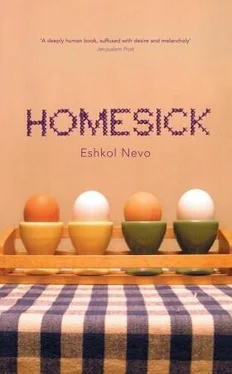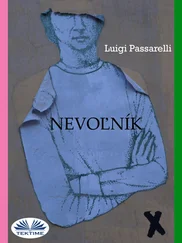Eshkol Nevo - Homesick
Здесь есть возможность читать онлайн «Eshkol Nevo - Homesick» весь текст электронной книги совершенно бесплатно (целиком полную версию без сокращений). В некоторых случаях можно слушать аудио, скачать через торрент в формате fb2 и присутствует краткое содержание. Год выпуска: 0101, ISBN: 0101, Издательство: Random House, Жанр: Современная проза, на английском языке. Описание произведения, (предисловие) а так же отзывы посетителей доступны на портале библиотеки ЛибКат.
- Название:Homesick
- Автор:
- Издательство:Random House
- Жанр:
- Год:0101
- ISBN:9781448180370
- Рейтинг книги:5 / 5. Голосов: 1
-
Избранное:Добавить в избранное
- Отзывы:
-
Ваша оценка:
- 100
- 1
- 2
- 3
- 4
- 5
Homesick: краткое содержание, описание и аннотация
Предлагаем к чтению аннотацию, описание, краткое содержание или предисловие (зависит от того, что написал сам автор книги «Homesick»). Если вы не нашли необходимую информацию о книге — напишите в комментариях, мы постараемся отыскать её.
Homesick
Homesick — читать онлайн бесплатно полную книгу (весь текст) целиком
Ниже представлен текст книги, разбитый по страницам. Система сохранения места последней прочитанной страницы, позволяет с удобством читать онлайн бесплатно книгу «Homesick», без необходимости каждый раз заново искать на чём Вы остановились. Поставьте закладку, и сможете в любой момент перейти на страницу, на которой закончили чтение.
Интервал:
Закладка:
Yes, I said, nodding, and remembered: just yesterday I didn’t buy anything at Angel’s because it was strange that Noa wasn’t with me. And then I thought: how can you compare?
She looked at her watch and said, I feel like something bad could happen to him. When Gidi went to Lebanon that last time, I also felt in my body that it was dangerous. I told him that when we were standing at the door on Sunday morning, but he laughed at me. He said, Mum, you thought the training course was dangerous too, and when we went down to the territories, you thought it was dangerous. So it must be that your worrying keeps me safe.
I could actually imagine it — the woman sitting next to me and the boy in the huge picture hanging in her living room facing each other for a second before what they couldn’t know would be their last hug. She’s wringing her hands, he’s shifting the straps of his backpack to get the blood circulating in his arms again.
I won’t survive it, she said, getting up from the sofa abruptly, as if the very fact of sitting seemed irresponsible to her. I won’t survive another one.
OK, I said, getting up too. Let’s get a few neighbours and start looking for him.
*
Inside, there were two rusty cans, a pile of coals and a smell, like someone had done a poo. And there was a mattress that looked new and a long shirt that only had one sleeve. It’s really kind of nice here, I thought. There’s no fridge or TV, but there aren’t any gigantic pictures of someone who’s dead or memorial candles with a smell that makes you feel sick and parents who don’t talk to each other. And not having a roof isn’t so bad either. Winter’s over already and it won’t rain any more. So who needs a roof? Just the opposite. A house without a roof is cool, like the car David’s brother has with the convertible top, the one we once rode in to a class party. You can sleep on the mattress at night and see all the stars, the Big Dipper and the Little Dipper, and the Milky Way that has no milk. Yes, I said out loud so it would be harder to change my mind later, I’ll stay here until night-time. And if it’s nice, maybe I’ll stay here for ever. No one cares anyway. They even forgot my birthday. I could disappear for a year now and they wouldn’t notice. Just the opposite. They’d be glad. That way they wouldn’t have to talk about my problems at school and they could keep on being angry with each other. They probably think I’m at Amir’s place. But he doesn’t care about me any more either. He doesn’t care about anything since Noa left. And he won’t even tell me why she left. Every time I ask him, he makes up some stupid reason, like I’m a little kid who’ll believe anything he says, like we’re not friends. I’m sure he was home today when I knocked on the door. I’m positive. He was probably reading one of those fat books of his and couldn’t be bothered to get up. Noa probably won’t come back and he’ll move out of the apartment soon and I won’t have anyone to play chess with.
That’s it. I decided. I’m going to live here. I lay down on the mattress and looked at the sky, waiting for the stars to come out.
*
I never saw anything like it in my life. Half an hour after the minute I knocked on Sima and Moshe’s door, the whole neighbourhood was outside. Children on skateboards, old men on their way back from the synagogue, Beitar fans on their way to a game — they all streamed to Yotam’s house. His father was standing on the steps leading the operation. Contrary to what his wife claimed, he didn’t look calm at all. Maybe he’d just been trying to calm her before, and maybe the presence of all those people had roused him. I don’t know. In any case, he was awake and alert, and he divided the people up into search parties. He sent Sima and me to search the area leading out of the neighbourhood, where the shops that sell building materials are. Where’s Moshe? I asked her. He stayed with Lilach and Liron, she said and started walking. Isn’t it amazing, I said, trying to keep up with her fast pace, how everyone came to help? Yes, she said. You probably don’t know that the people here are divided up into a few clans, depending on what part of Kurdistan their family came from. There are Dahuks, Amadis and Zakus, and each one thinks they’re better than the others. They’re at each other’s throats all year long, but when something like this happens, they put all that aside and come to help.
Dahuks? Amadis? What is she talking about? I’ve been here six months, I thought, and I still don’t understand anything.
We were getting closer to the outskirts of town. From a distance, we could see the search party that had been sent to Doga’s to check out the cage of boxes.
But the thing is, Sima said, following them with her eyes, that even when the pressure’s at its worst, they never forget who’s one of them and who isn’t. I’ve been living here for six years, and they still consider me an outsider. Without even thinking about it, they sent me out to look with the only person here who’s more of an outsider than I am. You.
I’m sorry … I started to say.
You have nothing to be sorry about, Sima interrupted. And besides, I kind of like being with you.
She touched my arm lightly when she said that, and immediately moved away, as if she’d scared herself.
You know, I said quickly, before she could break away completely, Yotam knocked on my door.
When, today?! she said, and stopped in front of Shlomo & Sons, Building Materials, and turned to me.
I could have lied. I’d left myself an escape hatch by not saying when. But I wanted to confess and expose my back to the lashes of the whip. Her whip.
Yes, I said. Around three. After he left his house and before he disappeared. I didn’t open the door to him. I always do, no matter when he knocks. But this time, I don’t know. I pulled the blanket over myself in bed and didn’t move until I heard him walking away. You’re the first person I’m telling this to. I’m so ashamed of myself. If I’d opened the door, he wouldn’t have run away. I would’ve played a little chess with him, calmed him down … We talk, you know. I love that kid, I really love him. I should have opened the door.
What’s done is done, Sima said, and her voice had no anger in it. Let’s start looking. I don’t think he’s here, but look over there, behind the parking lot.
*
Yotam’s mother circles the shops on the ground floor. She’s already done it twice with her friends, but feels the need to do it once more. Her eyes dart all over the place, searching for her son, and in her heart, she’s making deals with God. If you give him back in one piece, I promise to be a better person in every way. To light candles on Friday night. To recite psalms every day. OK, answers the God in her heart, I’ll consider it. But a minute before their imaginary handshake, she gets angry and cancels the deal. Consider it?! she yells, out loud now — the hell with you. You already took my older son, now you’re considering taking the younger one too!!
Enough, Nechama, her friends say, people are staring. They put their arms around her protectively. Let them stare, she says, I’m past caring. None of them knows how I feel. You’re right, her friends say, but we should go, they say, trying one more appeal. Maybe Yotam’s back already? Maybe he just went for a walk and lost his way? But we should go back anyway, because it’s late. OK, she says, her strength suddenly drained, whatever you say. Let’s go back, she says sadly. If they’ve found him already, then he needs me. Very badly.
Reuven, Yotam’s father, is holding a large torch. The sun has set and it’s a very dark night. Following him single file in the wadi are four other men. They have torches too, and they’re hurrying along, yelling Yotam! Yotam! again and again. And Reuven thinks: I haven’t wanted anything for six months. Not to eat. Not to drink. Not to dream. Not to think. Not to buy. Not to sell. The business is going to hell. Nehama asks, but he doesn’t tell. Sometimes he gets up in the morning and doesn’t know whether he’s alive or dead. As if his head has been split open like a peach. As if his blood has been sucked out by a leech. But no more. Now he wants to find Yotam. That’s all he’s living for. He walks faster and says to himself over and over again: find him, find him, find him. Reuven, one of the men rouses him, the path ends here. Come on, he says in a voice loud and clear. We’ll go this way. He walks around a big bush and climbs a slippery rock, the men right behind. He has no idea where he’s going, no idea what he’ll find. But he knows he can’t give up, so he lets his instincts lead. He tramples through every thorny bush and over every weed. Now and then, he stumbles and grabs one of the men so as not to fall. Then suddenly he sees something and gives a loud call. Tell me, he says, pointing into the darkness, do you see an Arab house or am I just imagining it? There really is something there, they say in amazement and slow down a bit. It’s strange, they say. There used to be an Arab village here, but not any more. Let’s go, he says, running as fast as he can towards the door.
Читать дальшеИнтервал:
Закладка:
Похожие книги на «Homesick»
Представляем Вашему вниманию похожие книги на «Homesick» списком для выбора. Мы отобрали схожую по названию и смыслу литературу в надежде предоставить читателям больше вариантов отыскать новые, интересные, ещё непрочитанные произведения.
Обсуждение, отзывы о книге «Homesick» и просто собственные мнения читателей. Оставьте ваши комментарии, напишите, что Вы думаете о произведении, его смысле или главных героях. Укажите что конкретно понравилось, а что нет, и почему Вы так считаете.












